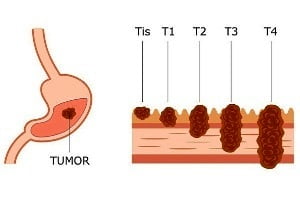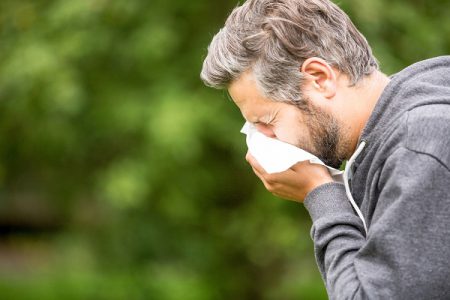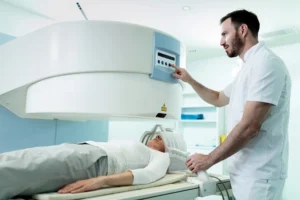Stomach Cancer Symptoms in Women
- Updated on: Jul 6, 2024
- 4 min Read
- Published on Mar 13, 2020

Stomach cancer or gastric cancer occurs due to the development of cancerous cells within the lining of the stomach. Stomach cancers are very difficult to diagnose at early stages because in most of cases they do not present any specific symptoms in initial stages.
Most of the stomach cancers are difficult to treat because they are diagnosed at later stages when they have already metastasized to other parts of the body. Learn about metastatic stomach cancer.
How Common is Stomach Cancer In Women?
Stomach cancers are very common in men compared to women. The American Cancer Society estimates that the chances of stomach cancer in women are almost 1 in 154. Males on the other hand have more risk of developing stomach cancer (1 in 95).
Stomach Cancer Symptoms Women Should Worry About
Although women have fewer chances of developing stomach cancer, still there are some symptoms that women should not ignore. It is not necessary that these symptoms always indicate stomach cancer but in some cases, they may raise a red flag for you.
Following are some of the symptoms that women should be careful about and should immediately report to a doctor:
Bloody Stools
The presence of blood in your stools can be a warning sign for stomach cancer but not always. In some cases, blood in your stools can be related to some other conditions as well.
If your bloody stools are caused by stomach cancer, it may be due to the inflammation caused by cancer in your stomach.
Stomach Pain
Severe stomach pain called epigastric pain is also a symptom of stomach cancer in some cases. Stomach cancer patients often complain about severe abdominal pain right under the bottom center of their ribs.
The pain may be caused due to some cancerous masses in your stomach. However, there are several other conditions that may cause stomach pain, such as indigestion, diverticulitis, and sometimes kidney stones.
If the pain is persistent and recurrent, you should surely plan to visit your doctor.
Loss of appetite
Appetite loss can be also a symptom of stomach cancer especially in people who have always been foodies.
Loss of appetite can be due to some other conditions as well such as depression, anxiety, kidney diseases, liver diseases, etc.
Stomach ulcer can also lead to a loss in appetite and is a risk factor for stomach cancer. Therefore, you should be careful and get yourself checked out regardless.
Heart Burn
Heartburn is very common in people who have gastric issues. But sometimes, it can be a warning sign for your stomach cancer. People suffering from peptic ulcers also present the symptoms of heartburn because they have more acid in their stomach which may put them at a higher risk of developing stomach cancer.
Unintentional Weight Loss
If you are losing your weight without any planning, it may be a sign of stomach cancer. Unexplained weight loss can be one of the first signs of stomach cancer as the disease has no other noticeable symptoms in the early stages.
You must be careful if you are unnecessarily shedding your pounds and should consult a doctor immediately.
Dysphagia (Difficulty in Swallowing)
If you have a difficulty in swallowing your food, there are higher chances that it may be due to a stomach tumor that is extending up into your food pipe (esophagus).
People who have dysphagia caused by stomach cancer often feel that the food is getting stuck in their throat. They may also feel choking and coughing while eating or drinking anything.
Some people even feel that the food is coming back into their esophagus immediately after eating it. This can be a warning sign and should be immediately checked.
Steps That Every Women Should Take for Preventing Stomach Cancer
Following are some of the steps that you should take for preventing stomach cancer:
- Avoid smoking
- Treat your stomach infections caused by H.Pylori
- Keep a check on your stomach ulcers and do not let them turn into cancers
- Limit the use of smoked and salted foods as they can irritate your stomach lining leading to stomach cancer
- Exercise regularly and keep yourself fit
- Keep a check on your weight
- Keep a check on your gastric issues like heartburn, indigestion, bloating, etc
FAQs
How Long can Stomach Cancer go Undetected?
Stomach cancer is very difficult to diagnose especially in the earlier stages because it does not present any specific symptoms. Most of the stomach cancers are diagnosed in advanced stages.
Can you Have Stomach Cancer and not Lose Weight?
Most people with stomach cancers tend to lose their weight without any reason, called unexplained weight loss. People who suffer from a sudden weight loss of more than 10 pounds are suspected of stomach cancer and may need further diagnosis.
Can you Have Stomach Cancer for Years and not Know it?
Yes, the majority of people remain undiagnosed for stomach cancer for several years until they have reached the advanced stage. Stomach cancer does not present any specific symptoms and therefore goes unnoticed.
Does Stomach Cancer Pain Come and Go?
Yes, in some cases, the epigastric pain caused due to stomach cancer is not persistent and therefore keeps on coming and going (recurrent) for years before the tumor is diagnosed.
At What Age Does Stomach Cancer Occur?
Stomach cancer is mostly found in older people who are above the age of 65. It is found that every year almost 6 out of 10 people are diagnosed with gastric cancer are either 65 or older.












